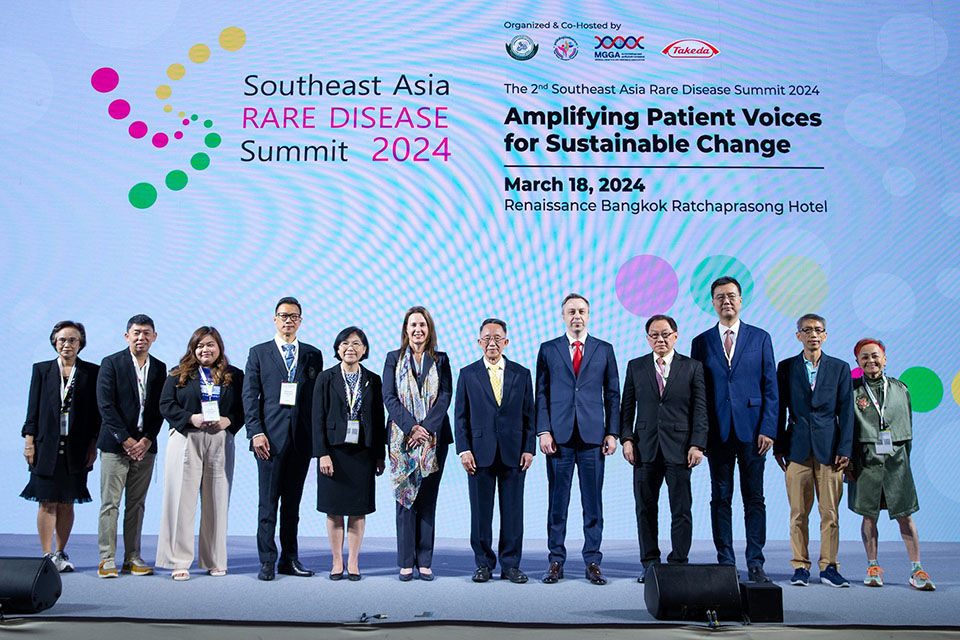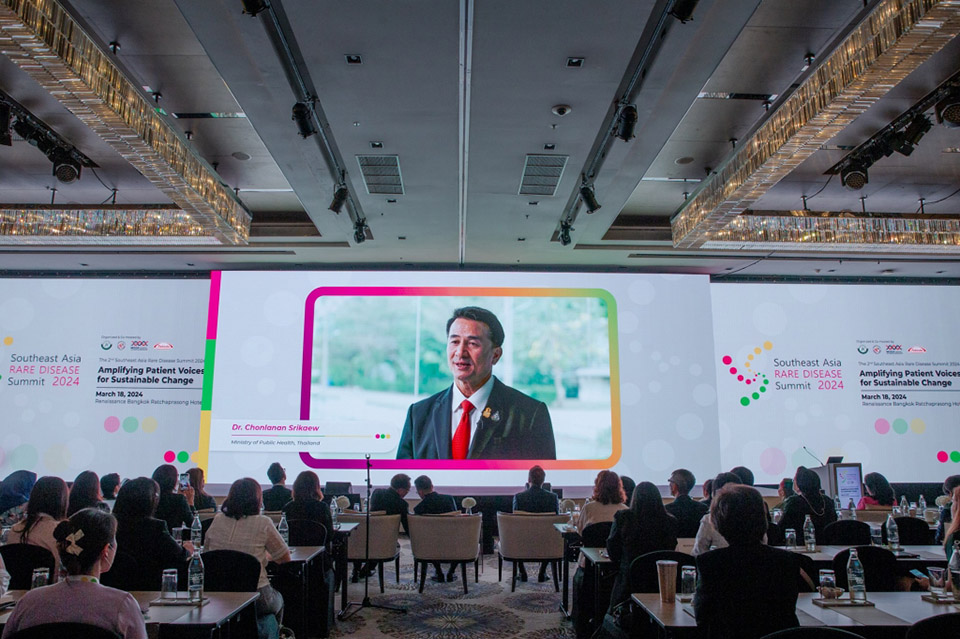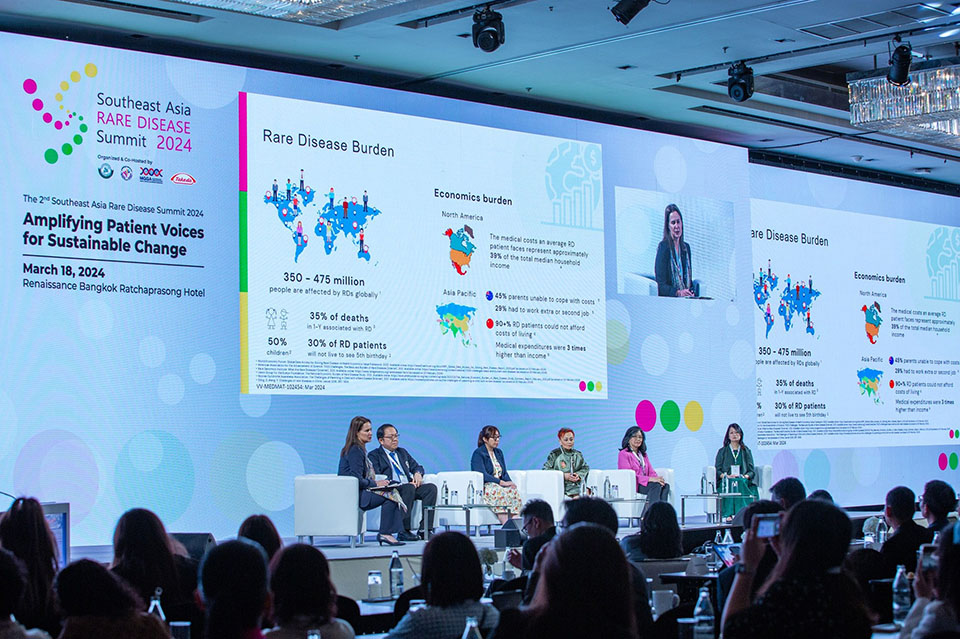
Rare diseases impact the lives of millions despite being rare. In Southeast Asia, an estimated 45 million people, approximately 9% of the region’s population, suffer from rare diseases1. In Thailand, 5% of the population or around 3 million people have rare diseases, and out of this segment, only 20,000 are receiving treatment2. The Medical Association of Thailand, under the Royal Patronage, Thai Rare Disease Foundation, and Medical Genetics and Genomics Association joined hands with Takeda (Thailand) Limited to host the second Southeast Asia Rare Disease Summit in Bangkok under the theme “Amplifying Patients Voices for Sustainable Change” to address the complex challenges posed by rare disease and ensure improvement for patients. At the summit, the region-wide healthcare experts, policy makers, patient advocacy groups and caregiver representatives gathered to discuss the unmet needs, exchanged experiences, and laid down a strategy to improve diagnosis, access to treatment, health equity as well as enhancing patient empowerment. This platform supports the rare disease community on the opportunity to share insights, exchange ideas, and pool our collective expertise to address the challenges facing individuals and families affected by rare diseases.
Dr. Cholnan Srikaew, Minister of Public Health, Thailand said “The government is dedicated to elevating the country’s healthcare system comprehensively, ensuring access for all citizens in every dimension, reaching people in every area. Additionally, it is pushing forward various projects to facilitate easier access to treatment for patients. Furthermore, rare diseases are prioritized as an important topic, with hospitals nationwide being trained to recognize various symptoms of rare disease for efficient screening. At-risk patient groups will be coordinated with the ‘Rare Disease Center’ in all 7 network hospitals around the country. Moreover, the Ministry of Public Health has extended the benefits of screening for metabolic genetic diseases leading to rare diseases in all newborn Thai infants, enabling rapid screening within 24-72 hours after birth. Such timely screening will expedite the treatment process, reducing the likelihood of loss. The second Southeast Asia Rare Disease Summit is an excellent opportunity for all stakeholders in the rare disease community to interact, collaborate, learn, share, and empower in pursuit of a united goal of community empowerment where everyone plays a proactive role in shaping healthcare policies and improving treatment access, ultimately contributing to better health outcomes and a more equitable healthcare system.

Assoc. Prof. Dr. Cherdchai Tontisirin, Vice Minister of Public Health said “Some medical conditions of rare disease are so rare that they can affect as few as one in three million people2 – and often, there are no viable treatment options. For patients living with rare diseases, this results in a wide set of challenges that starts with the diagnostic journey, with the average patient waiting for around four years before receiving an accurate diagnosis4. The rare disease community, hence, endeavors to bring about concrete changes and pursue healthcare equity.”
Professor Thanyachai Sura M.D., the president of Asia-Pacific Society of Human Genetics (APSHG) and the president of Medical Genetics and Genomics Association (MGGA) said “Diagnosis of Rare diseases takes time and that’s why the incidence is not as high as the other common diseases. Less awareness of rare diseases is one of the key factors contributing to delayed diagnosis and treatment. The other factors contribute to this delayed are the complex of the diseases and insufficient available laboratory tests for rare diseases. It is not surprised to hear that some patients taking 5-10 years to discover the cause before starting the proper treatment. Some patients may even pass away without knowing the true cause of one’s illness. Not only the patients, but their families and caregivers also bear the impact. Meanwhile, with fewer incidence of patients, treatment and medication costs are high and are unavailable in some countries. Therefore, it’s essential for the relevant stakeholders to support equal access to diagnosis and treatment for all patients and prioritize rare diseases in the healthcare system. When citizens have a good quality of life, the healthcare system and the country’s economy will also improve accordingly. Highlighting the importance of collaboration between private and public sectors in raising awareness of rare diseases is crucial for improving understanding and patient outcomes. The involvement of government agencies including the Ministry of Public Health and Ministry of Interior is instrumental in driving policy-led initiatives aimed at improving awareness, diagnosis, and treatment and addressing the unique healthcare needs of individuals with rare diseases.”
Patient empowerment and public-private collaboration are key to policy change.
In addition, both public and private sectors join hands to push for appropriate and fair health policies to elevate Thailand’s public healthcare system in a long run. There are a few patient advocacy groups established in Thailand for rare diseases. This coalition plays a crucial role in championing the rights, needs, and interests of individuals living with rare conditions whom facing healthcare challenges. With this empowerment, we can ensure that the patient voice is heard, valued, and amplified in all aspects of healthcare policy, practice, and research.

Peter Streibl, General Manager, Takeda Thailand said “Takeda is committed to supporting the rare disease community in all dimensions, raising awareness for patients living with rare diseases, advancing medical innovations, and amplifying patient voices. It is critical to explore how public stakeholders, healthcare communities and patients can come together to develop policies and solutions that ensure equitable access. The Second Southeast Asia Rare Disease Summit will further solidify its role as a pivotal platform for key stakeholders to engage in a dialogue, placing greater emphasis on patient empowerment and policy development. We will continue to collaborate with our partners and support the public health agenda to further advance the standard of care for Thai patients.”
Following the resounding success of the first Southeast Asia Rare Disease Summit where more than 500 participants around the globe from Asia, Europe, USA, Canada, Latin America, and the Middle East joined to discuss on the topic of how the equality of access to healthcare can usher the community into a sustainable success. Building upon the achievements of the first year, the second edition aims to further elevate the discourse and provide better patient outcomes that will shape the future of rare disease community.
For more information about Southeast Asia Rare Disease Summit 2024, please visit: https://seararediseasesummit.org/. (NNT)








